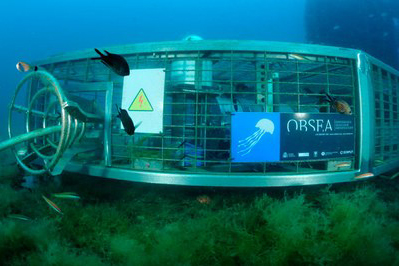
Serious games to improve the training of perfusionists in heart surgery
September 23, 2021
Monitoring underwater sound to reduce the impact of fishing activity
October 7, 2021The UPC Power Electronics Research Centre (PERC UPC) is participating in the international project High-pErformance moduLar battery packs for sustaInable urban electrOmobility Services (HELIOS), to develop a new concept of smart, modular, adaptable battery for electric vehicles.
The aim of HELIOS is to develop and integrate innovative materials, designs, technologies and processes to create a new concept of smart, modular, adaptable battery for a wide range of electric vehicles used for urban electromobility services, from medium-sized electric vehicles to electric buses, with better performance, energy density, lifetime and levelised cost of storage (LCoS)./p>
In this project, new advances will also be studied that integrate hardware and software solutions for the control of electrical and thermal systems that take advantage of new materials, power electronic devices, sensors and cutting-edge ICT, as well as the analysis of big data based on the cloud, artificial intelligence and IoT technologies (Internet of Things).

All of these advances combined enable an increase in energy and power density, that is, the amount of energy and power stored per unit volume of the battery and they provide key characteristics such as ultra-fast charging and safety improvement. They could also create better strategies for controlling fleets of electric vehicles, optimised procedures for charging and discharging, and predictive maintenance programmes, which would enable the lifetime of batteries to be extended.
In addition, the load status, health status and carbon footprint of each pack of batteries could be monitored during its entire lifecycle, which enables a chain of supply comprised of manufacture, reuse and recycling of lithium-ion battery packs. In addition, from a circular economy perspective, the project seeks to optimise the design of battery packs with reduced LCoS, so that they can be easily reused in second applications before they are recycled at the end of their life cycle.
Finally, the effectiveness of HELIOS will be assessed in different urban models of electromobility such as vehicle populations or fleets of electric busies, to determine the final scope of the project.
The HELIOS project is coordinated by Aarhus Universitet (Denmark) and has 18 collaborating entities in 8 European countries. The project is part of the Horizon 2020 – Societal Challenges programme of the European Research Council. It began in March 2018 and will last four years with a total budget of almost 11.5 m euros.
Technology
You want to know more?
Related Projects
- The Barcelona Innovative Transportation (BIT), the Research Center in Automotive and Advanced Mobility (CER-AMA) and The Future Mobility Research Hub (CARNET) research groups from the Universitat Politècnica de Catalunya - BarcelonaTech (UPC) are participating in the E-MED project, which aims to optimise energy and resource efficiency in public transport systems by addressing energy price fluctuations through smart and participatory solutions across the Mediterranean region.
- A research team involving the Barcelona Innovative Transportation (BIT), inLab FIB, CARNET Barcelona – Future Mobility Research Hub (CER-AMA), and the Department of Computer Architecture (DAC) of the Universitat Politècnica de Catalunya - BarcelonaTech (UPC) is driving the i-MovE project, which aims to incorporate multisectoral data to provide much more accurate and valuable information for the mobility sector. The project develops four use cases focused on both companies and mobility authorities, covering public and individual transport, using the UPCxels demonstrator.
- The Research Center for Supervision, Safety and Automatic Control (CS2AC-UPC) at the Universitat Politècnica de Catalunya - BarcelonaTech (UPC) has coordinated the SaCoAV project, focused on researching new methods and tools to ensure the safe coordination of autonomous vehicles in urban environments.
- As part of the USEFUL project, the Centre for Sensor, Instrumentation and Systems Development (CD6) at the Universitat Politècnica de Catalunya - BarcelonaTech (UPC) has equipped a low-emission vehicle that will drive through the streets of Terrassa with optical sensors integrated into a complex system for data computing, visualisation, and storage. This car will collect and store thousands of anonymous driving data points, which will be used to develop more accurate algorithms for autonomous driving.
30/09/2021
Project Header
right
no-repeat;left top;;
auto
20px
The UPC Power Electronics Research Centre (PERC UPC) is participating in the international project High-pErformance moduLar battery packs for sustaInable urban electrOmobility Services (HELIOS), to develop a new concept of smart, modular, adaptable battery for electric vehicles.
The aim of HELIOS is to develop and integrate innovative materials, designs, technologies and processes to create a new concept of smart, modular, adaptable battery for a wide range of electric vehicles used for urban electromobility services, from medium-sized electric vehicles to electric buses, with better performance, energy density, lifetime and levelised cost of storage (LCoS)./p>
In this project, new advances will also be studied that integrate hardware and software solutions for the control of electrical and thermal systems that take advantage of new materials, power electronic devices, sensors and cutting-edge ICT, as well as the analysis of big data based on the cloud, artificial intelligence and IoT technologies (Internet of Things).
Project Header
no-repeat;left top;;
auto
20px

full
center
All of these advances combined enable an increase in energy and power density, that is, the amount of energy and power stored per unit volume of the battery and they provide key characteristics such as ultra-fast charging and safety improvement. They could also create better strategies for controlling fleets of electric vehicles, optimised procedures for charging and discharging, and predictive maintenance programmes, which would enable the lifetime of batteries to be extended.
In addition, the load status, health status and carbon footprint of each pack of batteries could be monitored during its entire lifecycle, which enables a chain of supply comprised of manufacture, reuse and recycling of lithium-ion battery packs. In addition, from a circular economy perspective, the project seeks to optimise the design of battery packs with reduced LCoS, so that they can be easily reused in second applications before they are recycled at the end of their life cycle.
Finally, the effectiveness of HELIOS will be assessed in different urban models of electromobility such as vehicle populations or fleets of electric busies, to determine the final scope of the project.
The HELIOS project is coordinated by Aarhus Universitet (Denmark) and has 18 collaborating entities in 8 European countries. The project is part of the Horizon 2020 – Societal Challenges programme of the European Research Council. It began in March 2018 and will last four years with a total budget of almost 11.5 m euros.
Main Text
no-repeat;left top;;
auto
Technology
Logistics and Mobility
Tecnología
no-repeat;left top;;
auto
0px
25
Topic
Automotive Sector
Electronics
Telecom and software developers
Transport and mobility
Sector
no-repeat;left top;;
auto
0px
25
Tema
Inteligencia Artificial
Smart City
Internet of Things
Vehículo Eléctrico
Big Data
Tema
no-repeat;left top;;
auto
30px
40
You want to know more?
Contact Button
no-repeat;left top;;
auto
0px
no-repeat;left top;;
auto
50
Related Projects
Proyectos Relacionados
no-repeat;left top;;
auto
4
grid
4
tecnologias-de-logistica-y-movilidad-en
date
DESC




